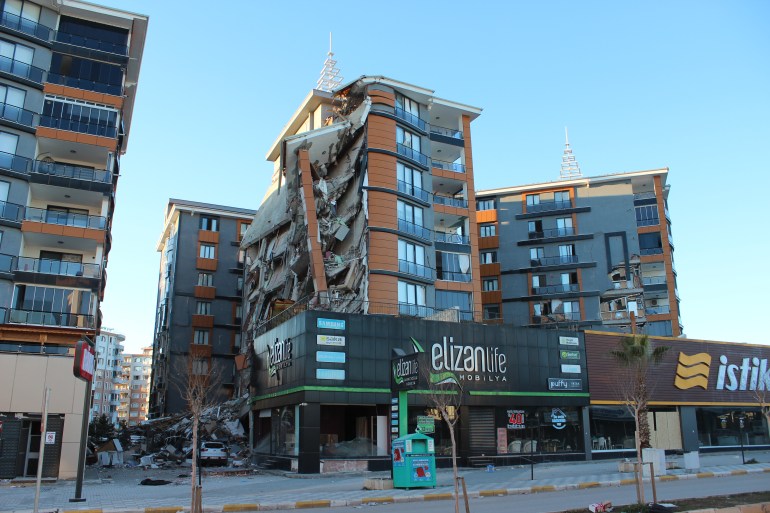Turkey earthquake: In hard-hit Adiyaman, no peace for survivors
Residents in southeastern Turkish city are reeling from earthquakes that killed thousands and caused widespread devastation.

Adiyaman, Turkey – After digging in rubble for 10 days, Ahmet Firat finally had no bodies left to recover – but he felt no peace.
“You see us, we look like we’re living but we’re dead. We lost 12 relatives; we also died with them,” the 39-year-old told Al Jazeera, outside his tent in a wind-blown expanse of open ground away from damaged buildings in Adiyaman, southeastern Turkey.
Keep reading
list of 4 itemsEarthquake fever grips Turkey’s Istanbul amid fears of ‘the big one’
Paint and tears: Northwest Syria commemorates 2023 earthquakes
‘She was the one’: Finding love in the midst of Turkey’s earthquake
Two powerful earthquakes last week devastated towns and cities across southeastern Turkey and northwestern Syria, killing tens of thousands of people and leaving many more in need of shelter and aid.
Firat, his wife Ayten, and their three children managed to flee their home in time with just the clothes they were wearing. But their rented property was destroyed and they are now staying with about 40 other family members across four tents.
The tent canvas, rugs and blankets from the authorities provide the only insulation from the cold in Adıyaman, where it has recently fallen to below zero at night. The family has a wood-fired stove, but the wind often blows smoke back into the tent, and when they put out the fire, the children get sick. They fear thieves and have heard stories of people kidnapping children, so one family member stays awake all night to keep watch.
“Our kids are terrified – everything makes them scared,” Ayten said. “They don’t want to be out of our eyesight.”
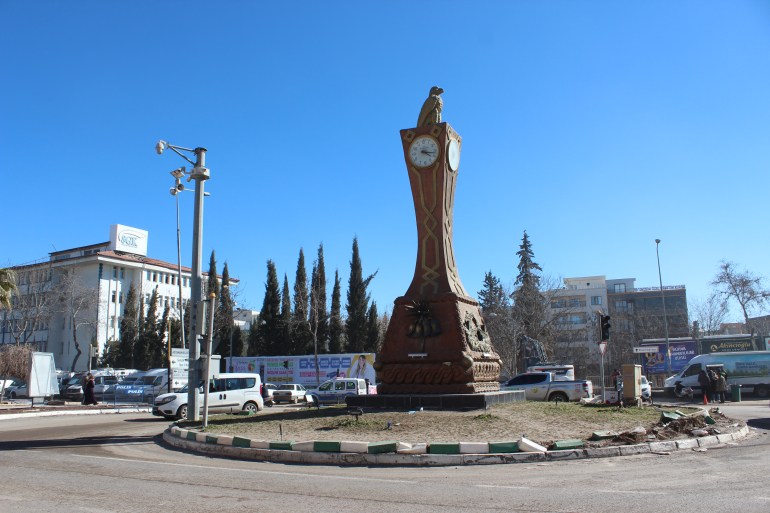
In the centre of Adiyaman, a clock tower stands frozen at 4:17am, when the initial magnitude 7.8 quake struck on February 6. Hours later, a subsequent 7.6 magnitude earthquake compounded the carnage.
Help from the authorities did not reach Adıyaman until the third day, with communications to the city of some 300,000 people cut and many roads damaged or hard to pass due to snow and heavy rain.
In the first days of the disaster, as the morgue was full and roads were blocked, bodies lay on the streets covered in blankets. Families were buried in the same grave due to limited space and there were not enough white funeral shrouds.
By Wednesday, more than 8,000 people were thought to have been killed in Adiyaman – a figure that is likely an underestimate – and hundreds of buildings have completely collapsed.
The city looks like a war zone, every block spilling debris into the streets. Many buildings are listing like shipwrecks, in others second and third floors have compressed those below to reach the ground, at times consuming parked cars.
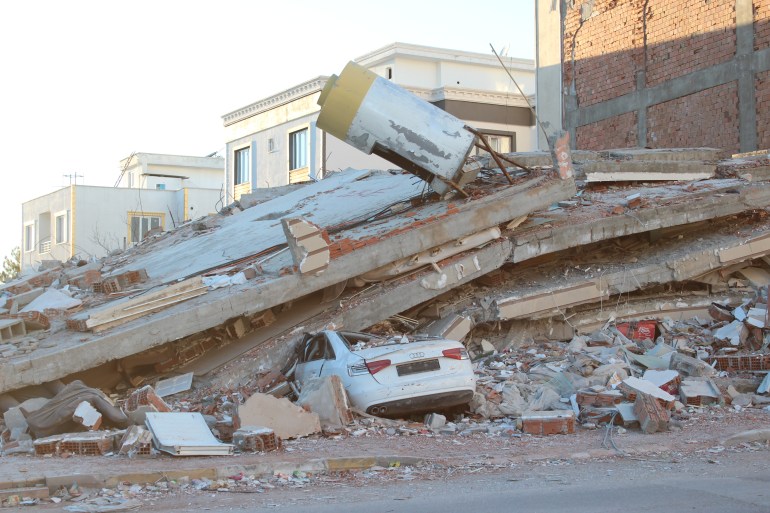
Tents provided by AFAD, Turkey’s emergency and disaster response agency, and other organisations are all over the city – from single shelters erected next to damaged homes, to vast encampments housing hundreds of people.
“Whoever has money has left Adiyaman, whoever doesn’t has stayed,” Bahri Taş, a 40-year-old call centre worker, told Al Jazeera.
Firat helped rescue 10 people, including five family members, but complained about a lack of available equipment in the first two days before the arrival of rescue teams. On Wednesday, rescue workers recovered the body of the final missing relative.
The focus has now shifted to transporting donated aid to people in hard-to-reach villages.
“Islam says you must help others as much as you can, so we are trying to follow our religion,” Firat said.
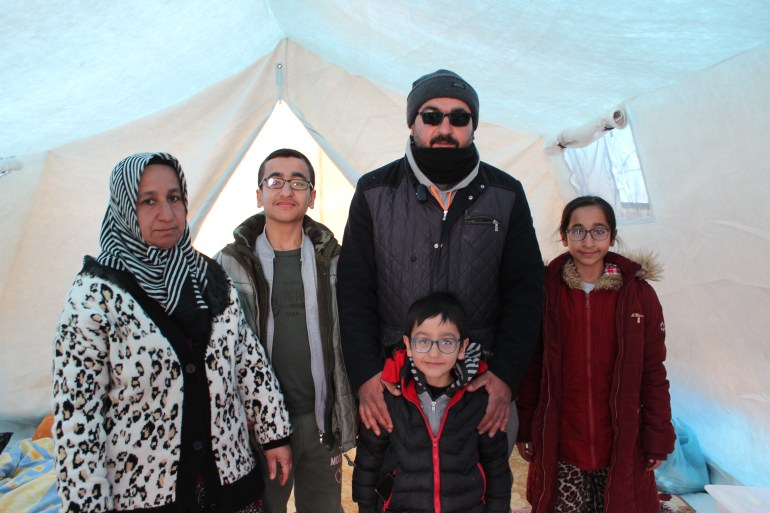
Although a 77-year-old woman was reportedly rescued in Adıyaman on Thursday, the search and rescue operations have mostly ended and much of the city is now eerily quiet. For many, the grief is turning into anger.
On Tuesday, a health worker in Adiyaman interrupted a live broadcast on the Haberturk news channel to rail against the authorities.
“The president should come here, if he dares. There is no lawmaker even [visiting] Adıyaman, no high-level officials. You all left us alone,” she shouted.
“Where is the crisis management? All those people died, all those children died. Wake up, Turkey!”
🔴 #DEPREM I Adıyaman’da bir sağlık çalışanı:
"Adıyaman 3 gün boyunca kaderine terk edildi, insanlar burada soğuktan donarak öldü. Cumhurbaşkanı yüzü yetiyorsa gelsin buraya…" pic.twitter.com/GgFp9H26kv
— dokuz8haber (@dokuz8haber) February 14, 2023
‘We don’t know what to do’
Turkey’s President Recep Tayyip Erdogan has said that while there were “shortcomings” in the state’s response to the earthquakes, the size of the affected areas – 10 provinces – and severe winter conditions meant it was “not possible to be prepared for such a disaster”. He has also pledged that all affected buildings would be rebuilt within a year.
Erdogan, who has visited several earthquake-hit cities, on Wednesday pledged to complete all search and rescue efforts and provide services to the victims “by making sure no one suffers”.
Taş said that the delays in reaching Adiyaman were understandable and that the authorities have worked tirelessly to rescue people and check ruined buildings, many of which are sprayed with paint indicating that have been checked more than once.
“[The state] gives us more aid that we need – we send that extra aid to other people in need,” he said. “The government helps as much as it can, but it can’t do everything”.
He said that in Adiyaman, a Kurdish-majority city whose politicians are mostly from the ruling AK Party, people were generally uniting.
“Even if we don’t support the same politics, we are trying to work together and solve all the problems together,” said Taş, who has been sleeping in a tent outside his parents’ house in the Cumhuriyet neighbourhood since the quakes.
But he said he also understood people’s anger.
“[The health worker who interrupted the broadcast] needed help from the government and she was losing people. People’s psychology is terrible right now here and they can be angry. The sadness is huge.”
He said he had sent his wife and children to Istanbul to protect their mental health.
“For my kids, it’s a really big trauma – even when the leaves shake, they are afraid.”
Near Taş’s parents’ house, a digger on Thursday clawed at a huge mound of rubble where the three-block Çınar apartment complex used to stand as AFAD rescuers searched for five people. Someone had been recovered alive from the complex’s rubble on Monday, but there had been no discoveries since.
Mehmet, a local resident, was waiting for news of his cousin’s family – two children had been found alive; the bodies of one child and the father had been found; the mother and another child were still missing.
“It’s hard to describe the impact, if you don’t live through this pain, you can’t understand … But this came from God, so what can we do?” he said. “We still have some hope. In [other earthquakes], people have survived beyond the 12th day.”
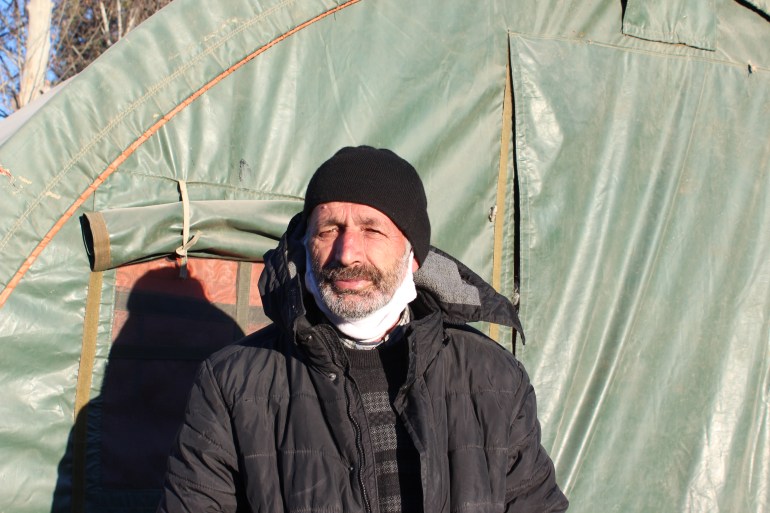
In many cases, the distance between life and death was a few feet or a wall.
Seyfettin Küçük’s niece and her son were pulled alive from the wreckage at the site. They had huddled together in what used to be the hallway of their flat to stay warm, but her husband was still missing.
“We don’t know our next steps, we don’t know what to do and it’s really painful,” he said. “We are also inside that rubble.”
‘There is no justice’
As night began to close in, people living in tents gathered around fires that lit their exhausted faces.
Part of the scale of the damage in Adiyaman is due to proximity to the epicentres of the two earthquakes, about 100km (62 miles) and 160km (99 miles), respectively. In some hard-hit areas, the ground was softer.
But many say it is also partly a man-made disaster, especially as many taller and newer buildings collapsed in the city. Some blamed contractors for defying regulations to make more money, and others went further by alleging corruption among the authorities that facilitated the law-breaking.
Turkey’s justice minister, Bekir Bozdag, said an investigation would hold people accountable for their role in collapsed buildings. The authorities so far have ordered the arrest of more than 130 people in connection to the damaged buildings.
At his family’s tent encampment, Ahmet – a plumber – said he had worked on many new buildings where the construction was shoddy and where contractors skimped on materials.
He said concerns he raised had been dismissed and that contractors paid bribes to officials to cover up their crimes.
“If I had the money, I wouldn’t stay in Turkey – not even for a minute,” Ahmet said. “There is no justice. If there was justice here, all these buildings wouldn’t have collapsed.”
